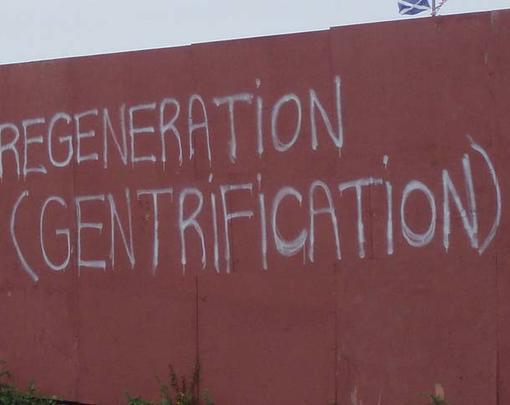Communities can do more than just put a Band-Aid on the problem of gentrification and displacement, and a panel of researchers who held a forum at the Democracy Collaborative’s offices in Washington discussed the best thinking and work happening on both sides of the Atlantic to keep housing affordable for everyone.
In a panel entitled “The Politics of Land and Housing,” The Democracy Collaborative’s Jarrid Green and Peter Gowan were joined by Laurie Macfarlane, who is based in Edinburgh, Scotland and is co-author of The Economics of Land and Housing and editor of openDemocracy. (Watch the full panel discussion below.) Together, they discussed the financial-sector-driven processes that keep housing costs spiraling upward and how we can move toward a world in which housing is a social good for all rather than a profit center for a few.
“The place that we’ve landed in is suboptimal for a whole range of reasons, and inequality is growing between those who own property and those who don’t; those who are facing higher rents and higher costs versus those who are riding the wave of increasing asset prices,” Macfarlane said.
Macfarlane stressed that “there is no single-bullet solution to what we do about this,” but the two speakers that followed laid out a set of strategies that are beginning to bear fruit either inside or outside the United States.
Gowan drew a contrast between the housing market in Ireland, which mirrors the United States in that it is driven largely by borrowing and rent-seeking, and Austria, where 40 percent of the residents live in “social housing” that is publicly owned and regulated. While in Ireland housing prices soared in the early 2000s before entering a crash that paralleled the U.S. financial crash in 2008, Austrian housing prices have remained stable throughout the past 20 years. One reason, Gowan said, is the attraction of good-quality affordable social housing to middle-class as well as lower-income households, who therefore don’t feel compelled go to into 15-to-30-year-debt to buy a home.
To Gowan, Austria’s example suggests that the US should overcome the negative stereotype of “public housing.” He concedes “there were legitimate issues” with the low-income housing built in decades past, but “that’s not to say that we can’t do better in the future. It’s not to say we can’t have a democratic community- or publicly controlled housing sector that is racially integrated, socially just and fit for the future.”
Green discussed work he did with the Alliance for Housing Solutions to help community leaders in Alexandria, Va., just outside Washington, to grapple with a market that has become increasingly inhospitable for low-income people.
The set of solutions that are being discussed around community control of land and housing, through such strategies as community land trusts, limited equity co-ops, land banks, resident ownership communities and community benefit agreements – together make up less than one percent of the housing economy in the United States, Green said. “It’s a mix of things that are approved by voters at the ballot box as well as some things that agencies can do on their own” with state or local funding. The challenge is to scale-up these solutions in the midst of what is increasingly acknowledged as an affordable housing crisis.
The strategies to address gentrification and displacement discussed in this panel will be explored more deeply in a report by Green that the Democracy Collaborative plans to release in August.





